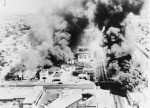The riots in Baltimore (a small part of the overall protest) really should not be that difficult to understand. To see why, consider the following hypothetical:
Imagine a nation in which the basic law of the land creates a single citizenship class but where public policy regularly divides the citizenry into two groups based on an arbitrary characteristic. For the first group, national and local governments assist citizens in obtaining private property and take active steps to increase the value of that property. Tax breaks, zoning ordinances, guarantees for low-interest loans, and higher quality public services all aid in this process. This is all done under the theory that broad home ownership and ever-increasing property values will produce a general social benefit. At the same time, however, national and local governments behave toward the second group in the opposite manner. After first working to segregate the groups, governments actively erect barriers to property ownership and take steps to devalue any existing private property.* This is done under the theory that government assistance to this second group will create a dangerous culture of dependence. This continues despite broad political claims that all citizens enjoy equal rights before the law.
Would you be surprised, in such a nation, that the second group viewed private property very differently than the first – that they saw it not as a foundation for individual liberty but rather as a means of control and a system of spoils? And if the second group had other reasons to distrust government – in matters of state-sanctioned violence, for instance – would you really expect them to value private property more than the lives of their fellow second-class citizens? Finally, would the question “Why are they destroying their own neighborhood?” make any sense in such a nation, knowing that almost none of the property in that neighborhood was “theirs” in any legal sense of the word?
This is the nation we live in.
I don’t know what’s really going on in the head of someone who breaks a window, loots a store, or sets fire to a building in the midst of protest. But I understand why such property damage might occur. More importantly, I understand that property-damage-as-protest is only illegitimate when judged from the perspective of those with access to private property.
The British saw the destruction of tea in Boston harbor as a senseless act of vandalism, one which would ultimately raise the cost of tea for the colonists. But the participants in the Boston Tea Party saw it as both more and less significant. More significant because it was a symbol of their refusal to remain silent when being treated as less-than-citizens. Less significant because, after all, what is property when weighed against life, liberty, and the pursuit of happiness?
* For a detailed description of how race-based housing policy worked to create a place like Ferguson, read this report from the Economic Policy Institute. For the best description I’ve read of the long history of government-sanctioned race-based looting, read Ta-Nehisi Coates’s “The Case for Reparations” from The Atlantic.
Latest posts by Jason LaBau (see all)
- Take Down the Confederate Monuments - August 14, 2017
- The Democratic Split - August 10, 2015
- On Lincoln and Our Second Founding - July 6, 2015

